The indystry 4.0 and a new version of the economics
Since 2010, the 4th Industrial Revolution called the Industry 4.0 (I4.0) has been making some
great changes in all spheres of the society by taking advantage of the digital-based technological
progress. Its basic pillars consist of big data, cloud computing and internet of things that convert
the visible physical resources towards the invisible digital ones. The former is endowed by natural
force like land and other natural resources and the later are made by people with unlimited source
of creativity. In fact, the scarcity of physical resources is more commonly mentioned than that of
digital source, hence, that the contemporary economics deals with the scare resources1 becomes
inappropriate. Such this point of departure, despite its being ambiguous to some extent, is revealing
a new version of economics on the basis of non-scarcity of digital resources. In other words, the I4.0
does not end the mission of the economics but gives it a new version.
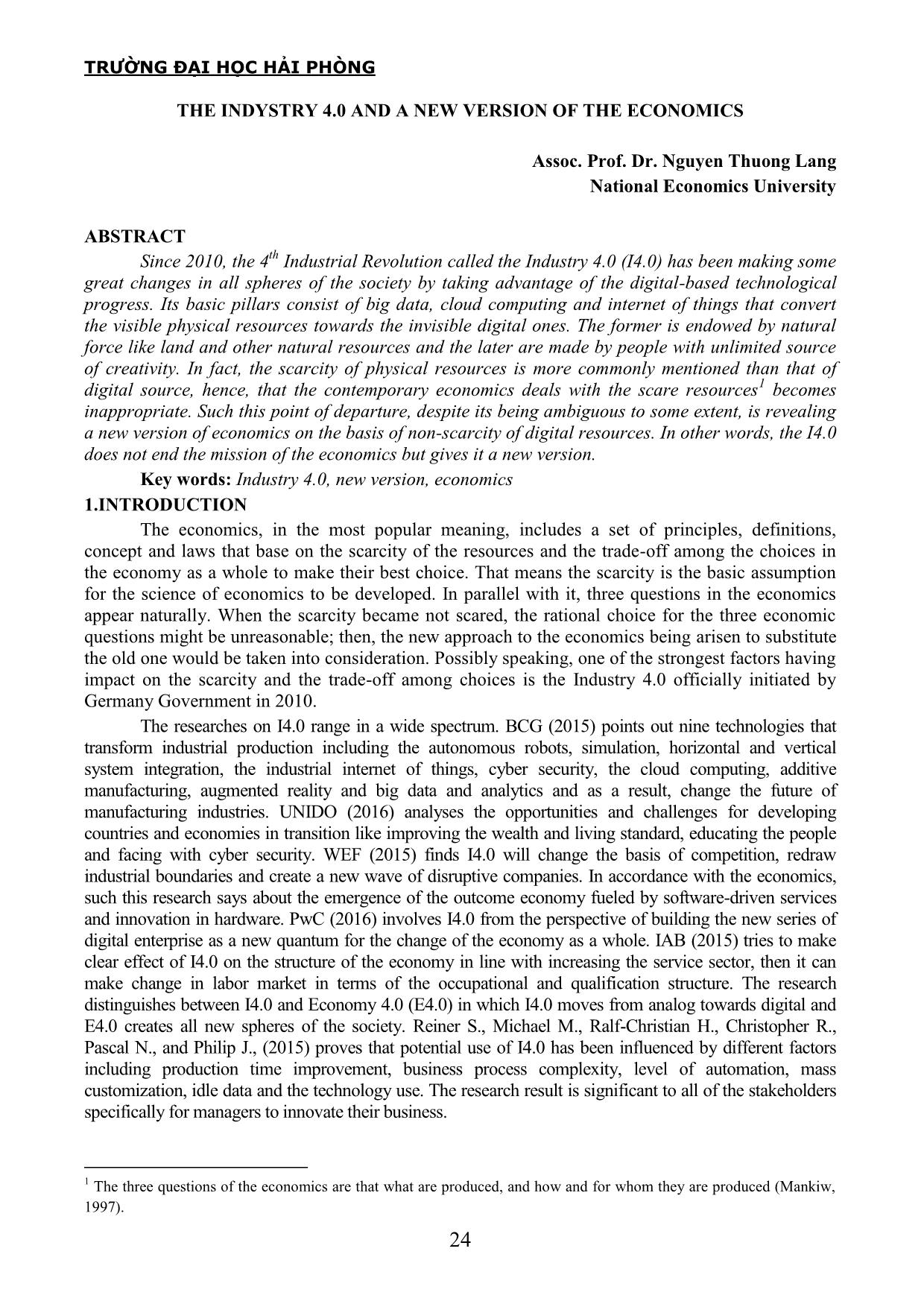
Trang 1
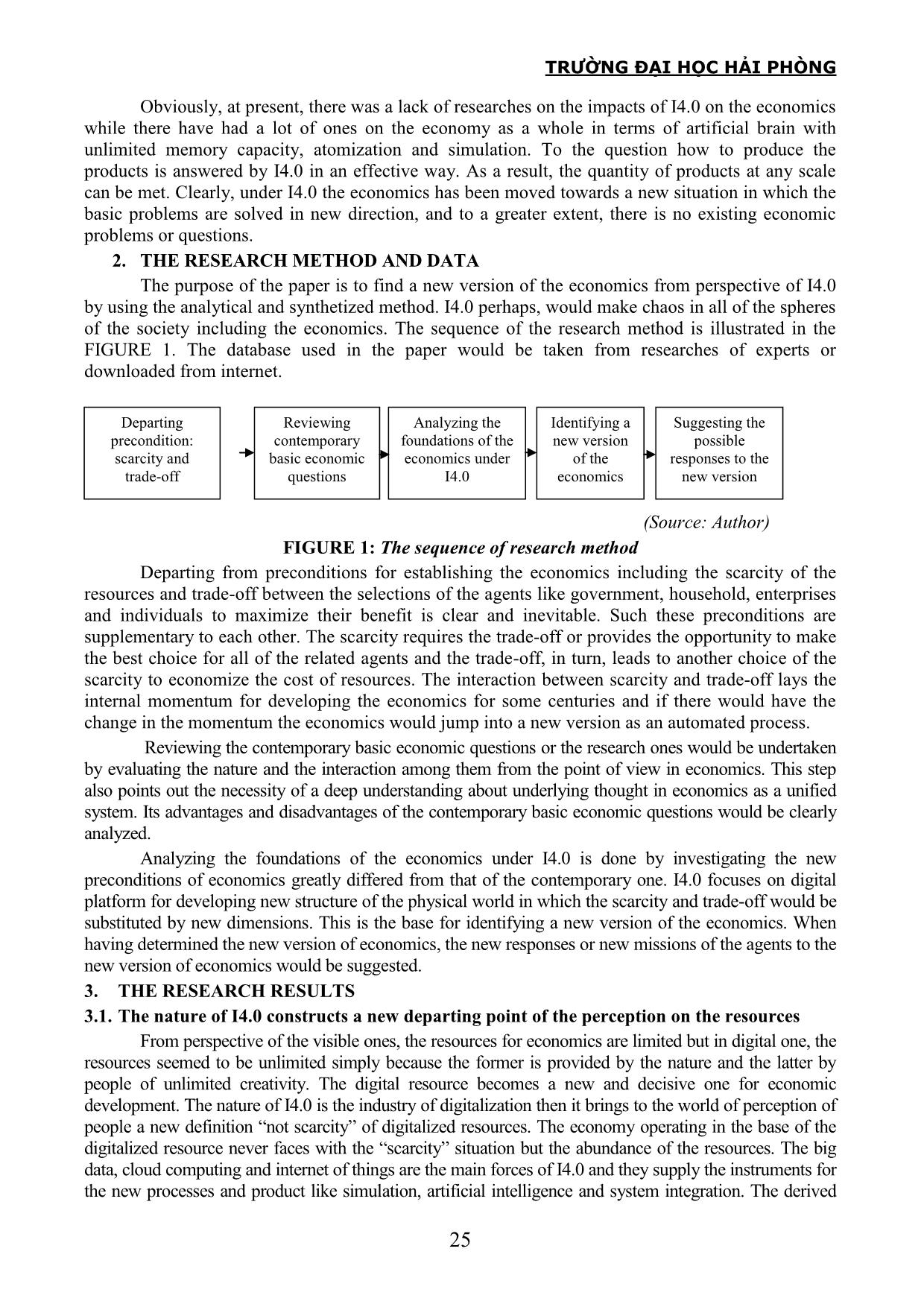
Trang 2
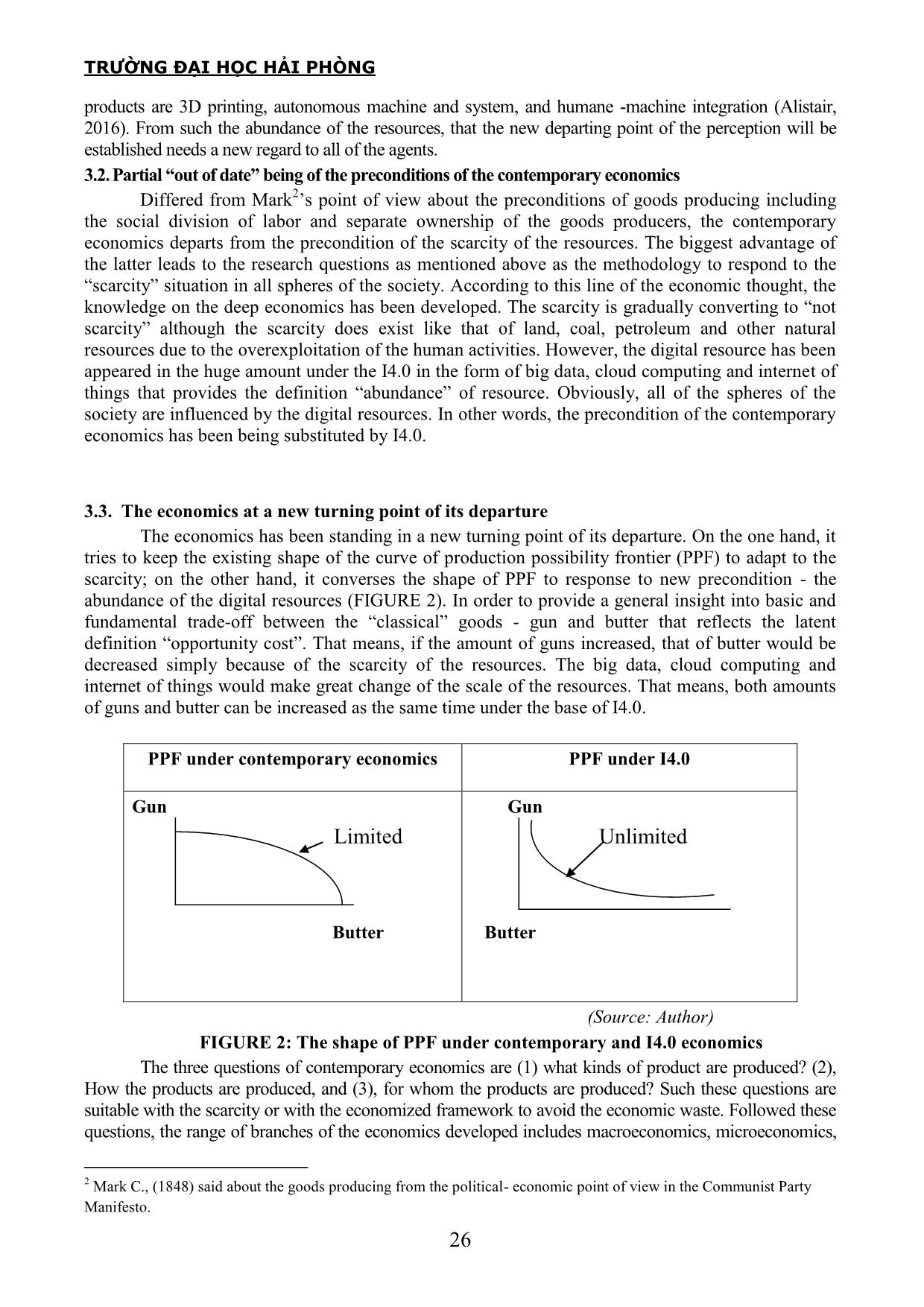
Trang 3
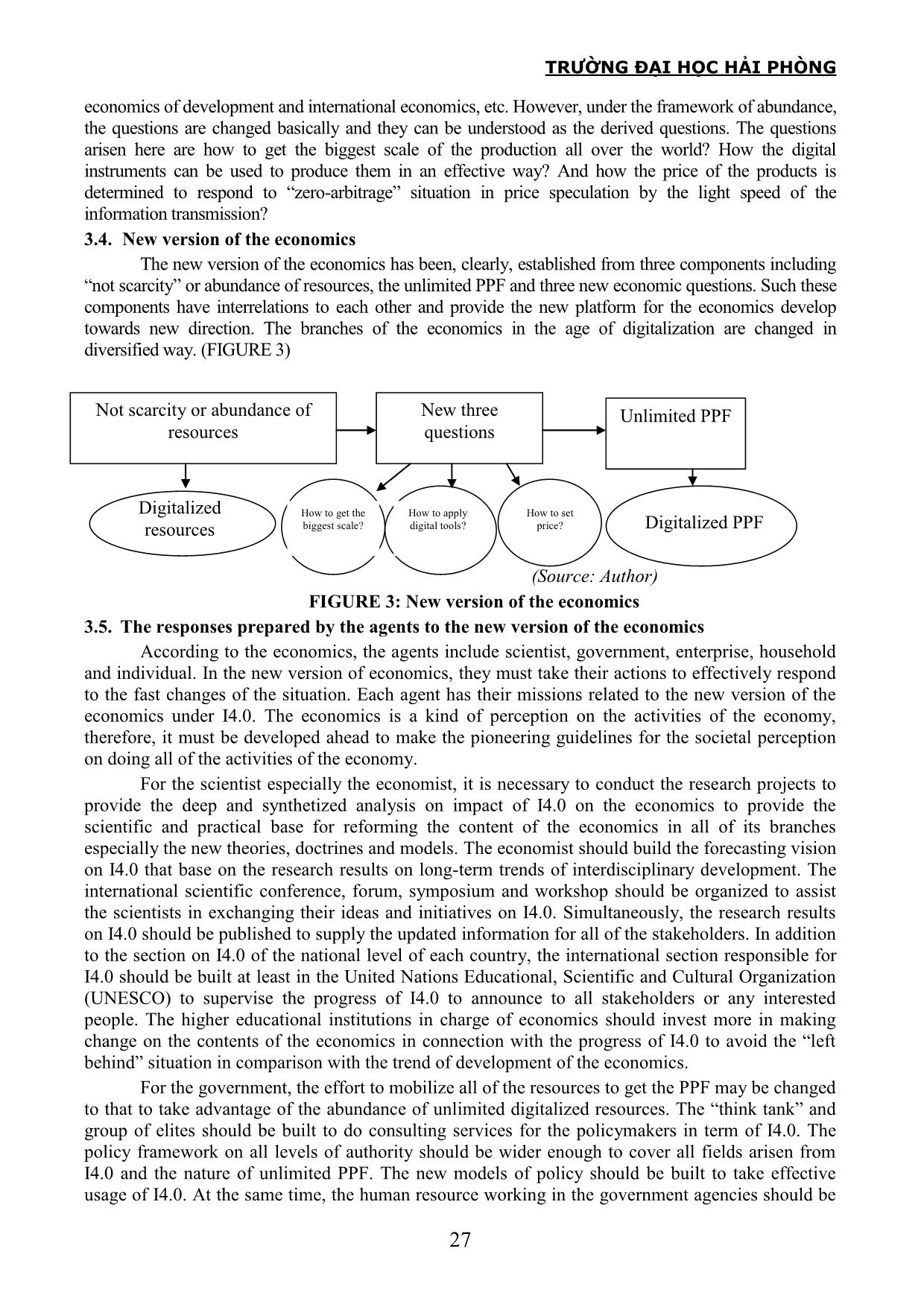
Trang 4
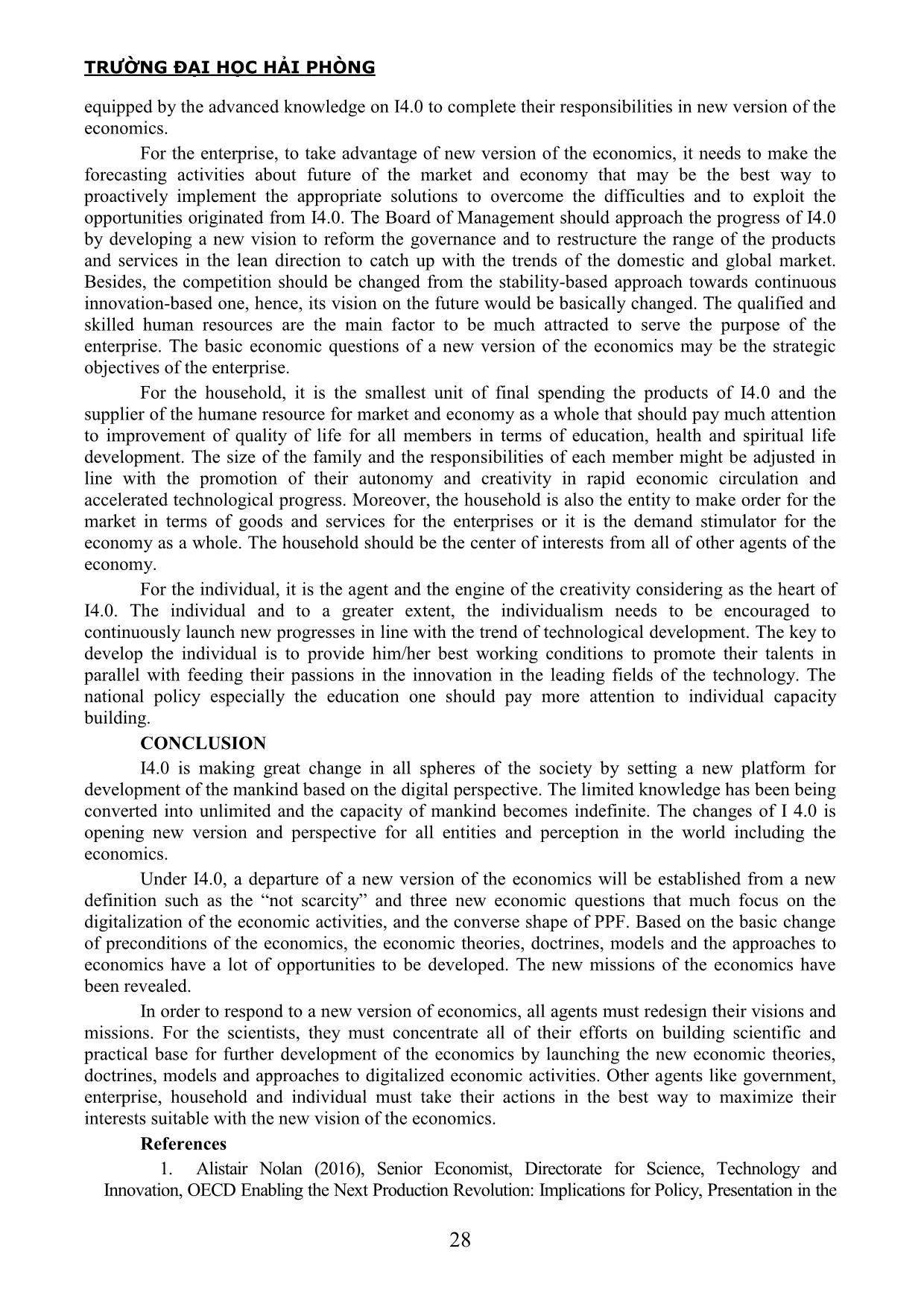
Trang 5
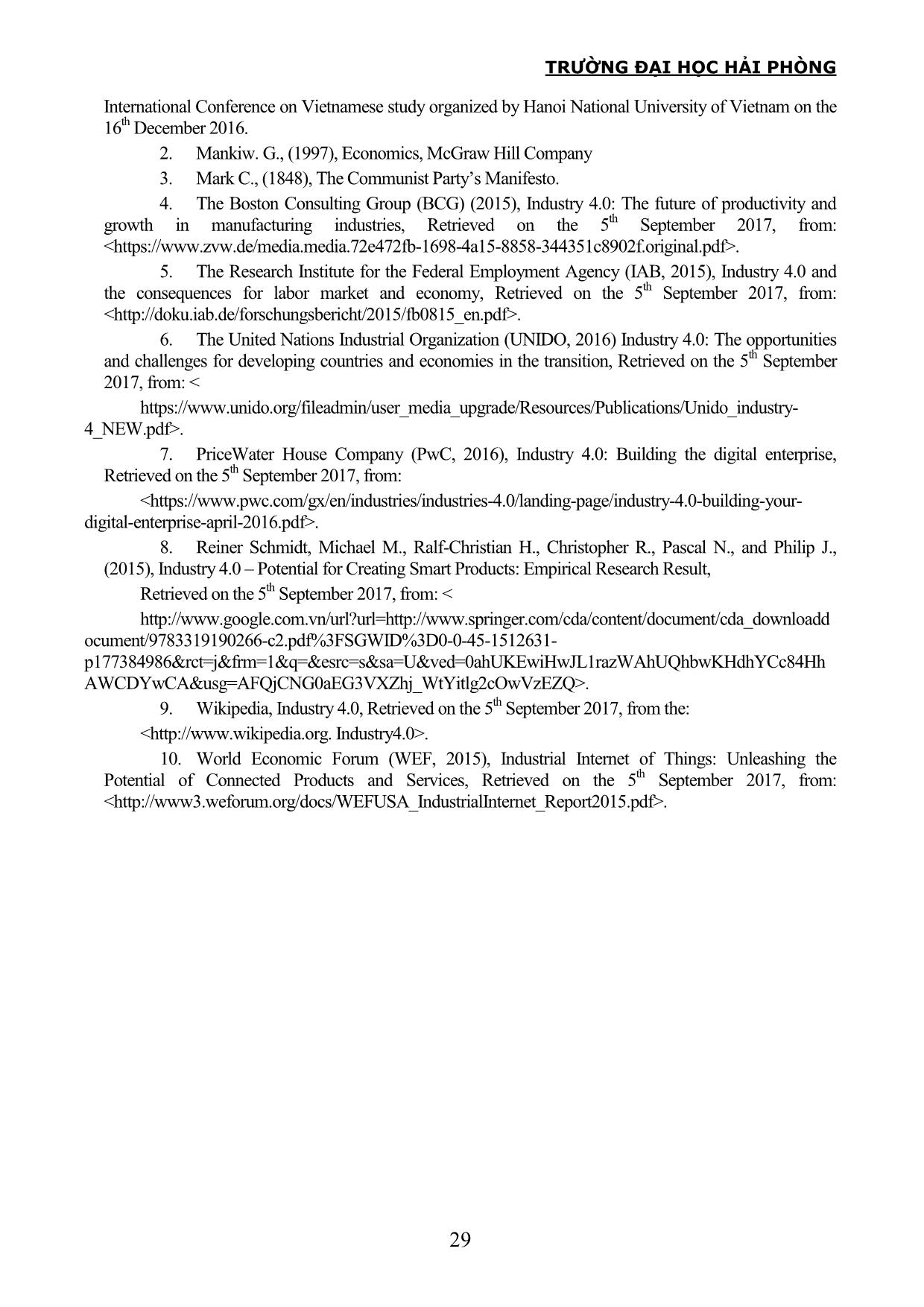
Trang 6
Tóm tắt nội dung tài liệu: The indystry 4.0 and a new version of the economics
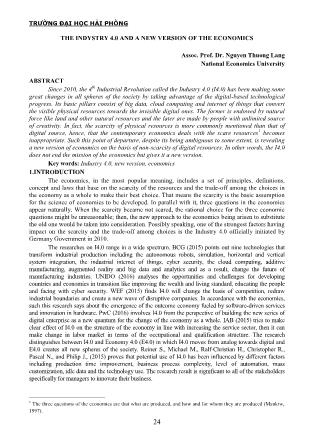
TRƯỜNG ĐẠI HỌC HẢI PHÒNG 24 THE INDYSTRY 4.0 AND A NEW VERSION OF THE ECONOMICS Assoc. Prof. Dr. Nguyen Thuong Lang National Economics University ABSTRACT Since 2010, the 4 th Industrial Revolution called the Industry 4.0 (I4.0) has been making some great changes in all spheres of the society by taking advantage of the digital-based technological progress. Its basic pillars consist of big data, cloud computing and internet of things that convert the visible physical resources towards the invisible digital ones. The former is endowed by natural force like land and other natural resources and the later are made by people with unlimited source of creativity. In fact, the scarcity of physical resources is more commonly mentioned than that of digital source, hence, that the contemporary economics deals with the scare resources 1 becomes inappropriate. Such this point of departure, despite its being ambiguous to some extent, is revealing a new version of economics on the basis of non-scarcity of digital resources. In other words, the I4.0 does not end the mission of the economics but gives it a new version. Key words: Industry 4.0, new version, economics 1.INTRODUCTION The economics, in the most popular meaning, includes a set of principles, definitions, concept and laws that base on the scarcity of the resources and the trade-off among the choices in the economy as a whole to make their best choice. That means the scarcity is the basic assumption for the science of economics to be developed. In parallel with it, three questions in the economics appear naturally. When the scarcity became not scared, the rational choice for the three economic questions might be unreasonable; then, the new approach to the economics being arisen to substitute the old one would be taken into consideration. Possibly speaking, one of the strongest factors having impact on the scarcity and the trade-off among choices is the Industry 4.0 officially initiated by Germany Government in 2010. The researches on I4.0 range in a wide spectrum. BCG (2015) points out nine technologies that transform industrial production including the autonomous robots, simulation, horizontal and vertical system integration, the industrial internet of things, cyber security, the cloud computing, additive manufacturing, augmented reality and big data and analytics and as a result, change the future of manufacturing industries. UNIDO (2016) analyses the opportunities and challenges for developing countries and economies in transition like improving the wealth and living standard, educating the people and facing with cyber security. WEF (2015) finds I4.0 will change the basis of competition, redraw industrial boundaries and create a new wave of disruptive companies. In accordance with the economics, such this research says about the emergence of the outcome economy fueled by software-driven services and innovation in hardware. PwC (2016) involves I4.0 from the perspective of building the new series of digital enterprise as a new quantum for the change of the economy as a whole. IAB (2015) tries to make clear effect of I4.0 on the structure of the economy in line with increasing the service sector, then it can make change in labor market in terms of the occupational and qualification structure. The research distinguishes between I4.0 and Economy 4.0 (E4.0) in which I4.0 moves from analog towards digital and E4.0 creates all new spheres of the society. Reiner S., Michael M., Ralf-Christian H., Christopher R., Pascal N., and Philip J., (2015) proves that potential use of I4.0 has been influenced by different factors including production time improvement, business process complexity, level of automation, mass customization, idle data and the technology use. The research result is significant to all of the stakeholders specifically for managers to innovate their business. 1 The three questions of the economics are that what are produced, and how and for whom they are produced (Mankiw, 1997). TRƯỜNG ĐẠI HỌC HẢI PHÒNG 25 Obviously, at present, there was a lack of researches on the impacts of I4.0 on the economics while there have had a lot of ones on the economy as a whole in terms of artificial brain with unlimited memory capacity, atomization and simulation. To the question how to produce the products is answered by I4.0 in an effective way. As a result, the quantity of products at any scale can be met. Clearly, under I4.0 the economics has been moved towards a new situation in which the basic problems are solved in new direction, and to a greater extent, there is no existing economic problems or questions. 2. THE RESEARCH METHOD AND DATA The purpose of the paper is to find a new version of the economics from perspective of I4.0 by using the analytical and synthetized method. I4.0 perhaps, would make chaos in all of the spheres of the soc ... of the contemporary one. I4.0 focuses on digital platform for developing new structure of the physical world in which the scarcity and trade-off would be substituted by new dimensions. This is the base for identifying a new version of the economics. When having determined the new version of economics, the new responses or new missions of the agents to the new version of economics would be suggested. 3. THE RESEARCH RESULTS 3.1. The nature of I4.0 constructs a new departing point of the perception on the resources From perspective of the visible ones, the resources for economics are limited but in digital one, the resources seemed to be unlimited simply because the former is provided by the nature and the latter by people of unlimited creativity. The digital resource becomes a new and decisive one for economic development. The nature of I4.0 is the industry of digitalization then it brings to the world of perception of people a new definition “not scarcity” of digitalized resources. The economy operating in the base of the digitalized resource never faces with the “scarcity” situation but the abundance of the resources. The big data, cloud computing and internet of things are the main forces of I4.0 and they supply the instruments for the new processes and product like simulation, artificial intelligence and system integration. The derived Reviewing contemporary basic economic questions Analyzing the foundations of the economics under I4.0 Identifying a new version of the economics Suggesting the possible responses to the new version Departing precondition: scarcity and trade-off TRƯỜNG ĐẠI HỌC HẢI PHÒNG 26 products are 3D printing, autonomous machine and system, and humane -machine integration (Alistair, 2016). From such the abundance of the resources, that the new departing point of the perception will be established needs a new regard to all of the agents. 3.2. Partial “out of date” being of the preconditions of the contemporary economics Differed from Mark 2‟s point of view about the preconditions of goods producing including the social division of labor and separate ownership of the goods producers, the contemporary economics departs from the precondition of the scarcity of the resources. The biggest advantage of the latter leads to the research questions as mentioned above as the methodology to respond to the “scarcity” situation in all spheres of the society. According to this line of the economic thought, the knowledge on the deep economics has been developed. The scarcity is gradually converting to “not scarcity” although the scarcity does exist like that of land, coal, petroleum and other natural resources due to the overexploitation of the human activities. However, the digital resource has been appeared in the huge amount under the I4.0 in the form of big data, cloud computing and internet of things that provides the definition “abundance” of resource. Obviously, all of the spheres of the society are influenced by the digital resources. In other words, the precondition of the contemporary economics has been being substituted by I4.0. 3.3. The economics at a new turning point of its departure The economics has been standing in a new turning point of its departure. On the one hand, it tries to keep the existing shape of the curve of production possibility frontier (PPF) to adapt to the scarcity; on the other hand, it converses the shape of PPF to response to new precondition - the abundance of the digital resources (FIGURE 2). In order to provide a general insight into basic and fundamental trade-off between the “classical” goods - gun and butter that reflects the latent definition “opportunity cost”. That means, if the amount of guns increased, that of butter would be decreased simply because of the scarcity of the resources. The big data, cloud computing and internet of things would make great change of the scale of the resources. That means, both amounts of guns and butter can be increased as the same time under the base of I4.0. PPF under contemporary economics PPF under I4.0 Gun Butter Gun Butter (Source: Author) FIGURE 2: The shape of PPF under contemporary and I4.0 economics The three questions of contemporary economics are (1) what kinds of product are produced? (2), How the products are produced, and (3), for whom the products are produced? Such these questions are suitable with the scarcity or with the economized framework to avoid the economic waste. Followed these questions, the range of branches of the economics developed includes macroeconomics, microeconomics, 2 Mark C., (1848) said about the goods producing from the political- economic point of view in the Communist Party Manifesto. Limited PPF Unlimited PPF TRƯỜNG ĐẠI HỌC HẢI PHÒNG 27 economics of development and international economics, etc. However, under the framework of abundance, the questions are changed basically and they can be understood as the derived questions. The questions arisen here are how to get the biggest scale of the production all over the world? How the digital instruments can be used to produce them in an effective way? And how the price of the products is determined to respond to “zero-arbitrage” situation in price speculation by the light speed of the information transmission? 3.4. New version of the economics The new version of the economics has been, clearly, established from three components including “not scarcity” or abundance of resources, the unlimited PPF and three new economic questions. Such these components have interrelations to each other and provide the new platform for the economics develop towards new direction. The branches of the economics in the age of digitalization are changed in diversified way. (FIGURE 3) (Source: Author) FIGURE 3: New version of the economics 3.5. The responses prepared by the agents to the new version of the economics According to the economics, the agents include scientist, government, enterprise, household and individual. In the new version of economics, they must take their actions to effectively respond to the fast changes of the situation. Each agent has their missions related to the new version of the economics under I4.0. The economics is a kind of perception on the activities of the economy, therefore, it must be developed ahead to make the pioneering guidelines for the societal perception on doing all of the activities of the economy. For the scientist especially the economist, it is necessary to conduct the research projects to provide the deep and synthetized analysis on impact of I4.0 on the economics to provide the scientific and practical base for reforming the content of the economics in all of its branches especially the new theories, doctrines and models. The economist should build the forecasting vision on I4.0 that base on the research results on long-term trends of interdisciplinary development. The international scientific conference, forum, symposium and workshop should be organized to assist the scientists in exchanging their ideas and initiatives on I4.0. Simultaneously, the research results on I4.0 should be published to supply the updated information for all of the stakeholders. In addition to the section on I4.0 of the national level of each country, the international section responsible for I4.0 should be built at least in the United Nations Educational, Scientific and Cultural Organization (UNESCO) to supervise the progress of I4.0 to announce to all stakeholders or any interested people. The higher educational institutions in charge of economics should invest more in making change on the contents of the economics in connection with the progress of I4.0 to avoid the “left behind” situation in comparison with the trend of development of the economics. For the government, the effort to mobilize all of the resources to get the PPF may be changed to that to take advantage of the abundance of unlimited digitalized resources. The “think tank” and group of elites should be built to do consulting services for the policymakers in term of I4.0. The policy framework on all levels of authority should be wider enough to cover all fields arisen from I4.0 and the nature of unlimited PPF. The new models of policy should be built to take effective usage of I4.0. At the same time, the human resource working in the government agencies should be Digitalized resources Digitalized PPF Not scarcity or abundance of resources New three questions Unlimited PPF How to get the biggest scale? How to apply digital tools? How to set price? TRƯỜNG ĐẠI HỌC HẢI PHÒNG 28 equipped by the advanced knowledge on I4.0 to complete their responsibilities in new version of the economics. For the enterprise, to take advantage of new version of the economics, it needs to make the forecasting activities about future of the market and economy that may be the best way to proactively implement the appropriate solutions to overcome the difficulties and to exploit the opportunities originated from I4.0. The Board of Management should approach the progress of I4.0 by developing a new vision to reform the governance and to restructure the range of the products and services in the lean direction to catch up with the trends of the domestic and global market. Besides, the competition should be changed from the stability-based approach towards continuous innovation-based one, hence, its vision on the future would be basically changed. The qualified and skilled human resources are the main factor to be much attracted to serve the purpose of the enterprise. The basic economic questions of a new version of the economics may be the strategic objectives of the enterprise. For the household, it is the smallest unit of final spending the products of I4.0 and the supplier of the humane resource for market and economy as a whole that should pay much attention to improvement of quality of life for all members in terms of education, health and spiritual life development. The size of the family and the responsibilities of each member might be adjusted in line with the promotion of their autonomy and creativity in rapid economic circulation and accelerated technological progress. Moreover, the household is also the entity to make order for the market in terms of goods and services for the enterprises or it is the demand stimulator for the economy as a whole. The household should be the center of interests from all of other agents of the economy. For the individual, it is the agent and the engine of the creativity considering as the heart of I4.0. The individual and to a greater extent, the individualism needs to be encouraged to continuously launch new progresses in line with the trend of technological development. The key to develop the individual is to provide him/her best working conditions to promote their talents in parallel with feeding their passions in the innovation in the leading fields of the technology. The national policy especially the education one should pay more attention to individual capacity building. CONCLUSION I4.0 is making great change in all spheres of the society by setting a new platform for development of the mankind based on the digital perspective. The limited knowledge has been being converted into unlimited and the capacity of mankind becomes indefinite. The changes of I 4.0 is opening new version and perspective for all entities and perception in the world including the economics. Under I4.0, a departure of a new version of the economics will be established from a new definition such as the “not scarcity” and three new economic questions that much focus on the digitalization of the economic activities, and the converse shape of PPF. Based on the basic change of preconditions of the economics, the economic theories, doctrines, models and the approaches to economics have a lot of opportunities to be developed. The new missions of the economics have been revealed. In order to respond to a new version of economics, all agents must redesign their visions and missions. For the scientists, they must concentrate all of their efforts on building scientific and practical base for further development of the economics by launching the new economic theories, doctrines, models and approaches to digitalized economic activities. Other agents like government, enterprise, household and individual must take their actions in the best way to maximize their interests suitable with the new vision of the economics. References 1. Alistair Nolan (2016), Senior Economist, Directorate for Science, Technology and Innovation, OECD Enabling the Next Production Revolution: Implications for Policy, Presentation in the TRƯỜNG ĐẠI HỌC HẢI PHÒNG 29 International Conference on Vietnamese study organized by Hanoi National University of Vietnam on the 16 th December 2016. 2. Mankiw. G., (1997), Economics, McGraw Hill Company 3. Mark C., (1848), The Communist Party‟s Manifesto. 4. The Boston Consulting Group (BCG) (2015), Industry 4.0: The future of productivity and growth in manufacturing industries, Retrieved on the 5 th September 2017, from: . 5. The Research Institute for the Federal Employment Agency (IAB, 2015), Industry 4.0 and the consequences for labor market and economy, Retrieved on the 5 th September 2017, from: . 6. The United Nations Industrial Organization (UNIDO, 2016) Industry 4.0: The opportunities and challenges for developing countries and economies in the transition, Retrieved on the 5 th September 2017, from: < https://www.unido.org/fileadmin/user_media_upgrade/Resources/Publications/Unido_industry- 4_NEW.pdf>. 7. PriceWater House Company (PwC, 2016), Industry 4.0: Building the digital enterprise, Retrieved on the 5 th September 2017, from: <https://www.pwc.com/gx/en/industries/industries-4.0/landing-page/industry-4.0-building-your- digital-enterprise-april-2016.pdf>. 8. Reiner Schmidt, Michael M., Ralf-Christian H., Christopher R., Pascal N., and Philip J., (2015), Industry 4.0 – Potential for Creating Smart Products: Empirical Research Result, Retrieved on the 5 th September 2017, from: < ocument/9783319190266-c2.pdf%3FSGWID%3D0-0-45-1512631- p177384986&rct=j&frm=1&q=&esrc=s&sa=U&ved=0ahUKEwiHwJL1razWAhUQhbwKHdhYCc84Hh AWCDYwCA&usg=AFQjCNG0aEG3VXZhj_WtYitlg2cOwVzEZQ>. 9. Wikipedia, Industry 4.0, Retrieved on the 5th September 2017, from the: . 10. World Economic Forum (WEF, 2015), Industrial Internet of Things: Unleashing the Potential of Connected Products and Services, Retrieved on the 5 th September 2017, from: .
File đính kèm:
 the_indystry_4_0_and_a_new_version_of_the_economics.pdf
the_indystry_4_0_and_a_new_version_of_the_economics.pdf

